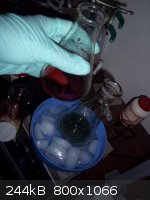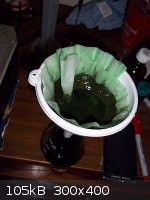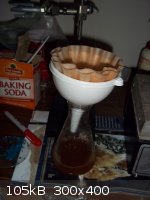| Pages:
1
2
3
4
5
6 |
sargent1015
Hazard to Others
  
Posts: 315
Registered: 30-4-2012
Location: WI
Member Is Offline
Mood: Relaxed
|
|
That is interesting, I don't know anything about alloy complex chemistry, are there some papers on the subject? I would love to understand a little
bit more about this.
|
|
|
Mixell
Hazard to Others
  
Posts: 449
Registered: 27-12-2010
Member Is Offline
Mood: No Mood
|
|
In those conditions the products of the dissolved alloy should act independently of each other. On some occasions different metal cations can form a
an insoluble compound in which one of the cations is present as a charged coordinated complex (such as CuCl3 (-)/CuCl4 (2-)/CoCl4 (2-). Cations such
as Cs+/Rb+ can be used to precipitate those complexes.
There are also mixed-valence compounds in which different cations (of the same or different element) are bridge by charge-transfer ligands, those
compounds can sometimes have a low charge-transfer activation energy, resulting in absorption in the visible spectrum. A good example of that is the
pigment"prussian blue".
There are also mixed oxides such as ilmenite and magnetite.
|
|
|
sargent1015
Hazard to Others
  
Posts: 315
Registered: 30-4-2012
Location: WI
Member Is Offline
Mood: Relaxed
|
|
More chemistry I would like to try:
Benzoate complexes
Imidazole complexes
Some amine complexes
I am an organic chemist in the lab, but at home I seem to have more of the inorganic mindset 
I am also thinking of putting a pre-pub of these syntheses onto the site, heavily citing bfessor's previous work.
|
|
|
sargent1015
Hazard to Others
  
Posts: 315
Registered: 30-4-2012
Location: WI
Member Is Offline
Mood: Relaxed
|
|
Just took an NMR of the aspirin that I isolated over the weekend and it is beautifully pure. I will try to attach a picture of the spectra tonight.
Good to know my material is of high quality before going on to the next steps 
|
|
|
DraconicAcid
International Hazard
    
Posts: 4416
Registered: 1-2-2013
Location: The tiniest college campus ever....
Member Is Offline
Mood: Semi-victorious.
|
|
One of my intended projects is making some anthranilates, and seeing if I can get crystals of them. I've got microcrystalline copper(II)
anthranilate, and will try nickel, cobalt, iron, and possibly chromium.
Please remember: "Filtrate" is not a verb.
Write up your lab reports the way your instructor wants them, not the way your ex-instructor wants them.
|
|
|
sargent1015
Hazard to Others
  
Posts: 315
Registered: 30-4-2012
Location: WI
Member Is Offline
Mood: Relaxed
|
|
Oooo do that! If I may ask, where did you get the anthranilate?
|
|
|
DraconicAcid
International Hazard
    
Posts: 4416
Registered: 1-2-2013
Location: The tiniest college campus ever....
Member Is Offline
Mood: Semi-victorious.
|
|
We ordered anthranilic acid for the college shortly before it became listed as a possible drug precursor. Whether or not we'll ever get more remains
to be seen.
[Edited on 25-6-2013 by DraconicAcid]
Please remember: "Filtrate" is not a verb.
Write up your lab reports the way your instructor wants them, not the way your ex-instructor wants them.
|
|
|
sargent1015
Hazard to Others
  
Posts: 315
Registered: 30-4-2012
Location: WI
Member Is Offline
Mood: Relaxed
|
|
Talk about lucky snag. That amine makes it an excellent ligand. And if it is the free acid version, you could even make it behave bidentate!
Update, iron aspirinate particulate is incredibly fine and difficult to filter 
|
|
|
nezza
Hazard to Others
  
Posts: 324
Registered: 17-4-2011
Location: UK
Member Is Offline
Mood: phosphorescent
|
|
I haven't isolated any aspirinates, but came across an interesting colour reaction with cobalt salicylate complex. Cobalt complexes with various
amines quite well and in alkaline solution cobalt III is readily formed by adding hydrogen peroxide. These complexes are usually blue to dark blue. On
re-acidifying the EDTA complex it goes a dark magenta colour, much darker than the cobalt II ion. With salicylate and alkaline peroxide a dark green
colour is produced which slowly (over several hours) goes yellow-brown. Green is unusual for cobalt so is this contamination ?.
|
|
|
DraconicAcid
International Hazard
    
Posts: 4416
Registered: 1-2-2013
Location: The tiniest college campus ever....
Member Is Offline
Mood: Semi-victorious.
|
|
Quote: Originally posted by nezza  | | I haven't isolated any aspirinates, but came across an interesting colour reaction with cobalt salicylate complex. Cobalt complexes with various
amines quite well and in alkaline solution cobalt III is readily formed by adding hydrogen peroxide. These complexes are usually blue to dark blue. On
re-acidifying the EDTA complex it goes a dark magenta colour, much darker than the cobalt II ion. With salicylate and alkaline peroxide a dark green
colour is produced which slowly (over several hours) goes yellow-brown. Green is unusual for cobalt so is this contamination ?.
|
I think the tris(carbonato)cobaltate(III) complex is green, so I wouldn't be surprised if tris(salicylato)cobaltate(III) was also green. Then again,
iron(III) turns salicylate purple, but decomposes, so I would also not be surprised if cobalt(III) will also oxidize and decompose a phenol such as
salicylate.
This paper gives a synthesis of both the carbonato and salicylato complexes: http://pubs.acs.org/doi/abs/10.1021/ja01504a004
I don't have access to the full paper.
Please remember: "Filtrate" is not a verb.
Write up your lab reports the way your instructor wants them, not the way your ex-instructor wants them.
|
|
|
sargent1015
Hazard to Others
  
Posts: 315
Registered: 30-4-2012
Location: WI
Member Is Offline
Mood: Relaxed
|
|
Here's that paper.
Attachment: ja01504a004.pdf (287kB)
This file has been downloaded 1129 times
I think I will attempt the Tris-carbonatocobaltate(III) Trihydrate tonight if time allows 
[Edited on 26-6-2013 by sargent1015]
|
|
|
DraconicAcid
International Hazard
    
Posts: 4416
Registered: 1-2-2013
Location: The tiniest college campus ever....
Member Is Offline
Mood: Semi-victorious.
|
|
Quote: Originally posted by sargent1015  | Here's that paper.
I think I will attempt the Tris-carbonatocobaltate(III) Trihydrate tonight if time allows 
[Edited on 26-6-2013 by sargent1015] |
Thanks for posting that. Now I'm wondering if cobalt(III) aspirinate and/or anthranilate would be stable
[Edited on 26-6-2013 by DraconicAcid]
Please remember: "Filtrate" is not a verb.
Write up your lab reports the way your instructor wants them, not the way your ex-instructor wants them.
|
|
|
nezza
Hazard to Others
  
Posts: 324
Registered: 17-4-2011
Location: UK
Member Is Offline
Mood: phosphorescent
|
|
Thanks for the post folks. I'll look into these complexes a bit more.
|
|
|
sargent1015
Hazard to Others
  
Posts: 315
Registered: 30-4-2012
Location: WI
Member Is Offline
Mood: Relaxed
|
|
Quote: Originally posted by DraconicAcid  |
Thanks for posting that. Now I'm wondering if cobalt(III) aspirinate and/or anthranilate would be stable
[Edited on 26-6-2013 by DraconicAcid] |
Hmmm, that is an interesting idea. Let me know if you give it a shot. Might be a fun test tube reaction to run 
|
|
|
Number 9
Harmless

Posts: 34
Registered: 23-3-2012
Location: Grajagan
Member Is Offline
Mood: ingin tahu semua
|
|
| Quote: |
Fe(ll)acetylsalicylate could be formed. You need a solution of FeCl3 and salicylic acid. Then reduce it with hydroxylamine. The slightly yellow colour
is transformed in a orange solution. By spectroscopic determination you can estimate the Fe - acetylsalicylate molar ratio. It's proven, I have the
documents.
[Edited on 27-6-2013 by Number 9] |
|
|
|
Acidum
Harmless

Posts: 39
Registered: 2-5-2013
Location: Serbia
Member Is Offline
Mood: Sublimed
|
|
Very nice, interesting and inspiring articles! (referring to this one and Cu(II) related)
I like the methodical approach that You follow, puts science back in the title. Looking forward to see further results!
And yes, will try some of these as soon as I finish reorganizing my lab and purifying chemicals...
PS
Call me grammar/iupac/nerdy nazi, but I just can not look at titles and swallow "aspirinate" as proper name, especially from someone with master in
chemistry who actually does research. And referring to ASA as "aspirin" as well. I would definitely be happier if You (or admin/mod) could rename
threads at least to "acetylsalicylates (aspirinates)".
In Serbia, acetylsalicylic acid is more often sold as "Andol", "Anbol" and "Midol". If I put my results here, should I refer to them as "andolates,
anbolates and midolates"? Or "polyandolate"...
PPS. Yes, I really have a grudge against pharmacy, and I think of their tradenames in my belovin' chemistry as of utter blasphemy! 
...and then I disappeared in the mist...
|
|
|
sargent1015
Hazard to Others
  
Posts: 315
Registered: 30-4-2012
Location: WI
Member Is Offline
Mood: Relaxed
|
|
Quote: Originally posted by Acidum  | Call me grammar/iupac/nerdy nazi, but I just can not look at titles and swallow "aspirinate" as proper name, especially from someone with master in
chemistry who actually does research. And referring to ASA as "aspirin" as well. I would definitely be happier if You (or admin/mod) could rename
threads at least to "acetylsalicylates (aspirinates)".
|
This is in direct quote from the literature. Sooooo.... we will have to beg to differ in terms of naming (for some reason I am quite fond of the name
aspirinates, probably since I have been messing with them for a week now  ) )
[edit] this is in reference to "copper aspirinates" almost exclusively, since most of the other metals are named as acetylsalicylates.
[Edited on 27-6-2013 by sargent1015]
|
|
|
sargent1015
Hazard to Others
  
Posts: 315
Registered: 30-4-2012
Location: WI
Member Is Offline
Mood: Relaxed
|
|
Synthetic updates!
The green cobalt complex:
Sodium Tris-carbonatocobaltate (III) Trihydrate
(The procedure is given in the above paper: Bauer & Drinkard, 1960).
This is cool since most cobalt III compounds are unstable 


The brown stuff is the iron aspirinate, not great for gravity filtration setup due to the fine particle size. The procedure is given in Lynch, et.
al. 1982.

[Edited on 28-6-2013 by sargent1015]
|
|
|
DraconicAcid
International Hazard
    
Posts: 4416
Registered: 1-2-2013
Location: The tiniest college campus ever....
Member Is Offline
Mood: Semi-victorious.
|
|
Very cool!
Please remember: "Filtrate" is not a verb.
Write up your lab reports the way your instructor wants them, not the way your ex-instructor wants them.
|
|
|
sargent1015
Hazard to Others
  
Posts: 315
Registered: 30-4-2012
Location: WI
Member Is Offline
Mood: Relaxed
|
|
Could one of the moderators move this to "Chemistry in General"? or should I make a thread for each class of compound (aspirinates,
salicylates, cobaltates, etc.)?
Well, we proved one thing, cobalt has an amazing array of colored complexes  I'm excited to try the acetylsalicylate and salicylate complexes as well.
I'm excited to try the acetylsalicylate and salicylate complexes as well.
So there was an above post asking if one could make cobalt (III) aspirinate and if it was stable, that is my goal for tonight 
|
|
|
DraconicAcid
International Hazard
    
Posts: 4416
Registered: 1-2-2013
Location: The tiniest college campus ever....
Member Is Offline
Mood: Semi-victorious.
|
|
Quote: Originally posted by sargent1015  | | Well, we proved one thing, cobalt has an amazing array of colored complexes. I'm excited to try the acetylsalicylate and salicylate complexes as
well. |
We knew that already. Cobalt(III) is great- its complexes (when they don't decompose due to internal oxidation) are quite stable, and colourful. If
you've got ethylenediamine, there is a whole raft of cool complexes to be made (one favourite is [Co(en)2Cl2]Cl. The cis and trans isomers are
dramatically different colours- bright green and dark purple. If the green looks cruddy, mix the solution with sodium nitrate to give insoluble salt,
which is always pure and pretty (the other isomer's nitrate is soluble). The potassium hexanitrito complex is also simple to make if you have
potassium nitrite- it's a lovely yellow, and its synthesis is often used as a test for cobalt in qualitative analysis.
| Quote: | | So there was an above post asking if one could make cobalt (III) aspirinate and if it was stable, that is my goal for tonight. |
Good luck!
Please remember: "Filtrate" is not a verb.
Write up your lab reports the way your instructor wants them, not the way your ex-instructor wants them.
|
|
|
sargent1015
Hazard to Others
  
Posts: 315
Registered: 30-4-2012
Location: WI
Member Is Offline
Mood: Relaxed
|
|
Is there a convenient source of this? I have not checked ebay at the time of this posting, but I have always wanted to get my hands on that compound.
Fun to work with, but holy crap smelly lol 
|
|
|
DraconicAcid
International Hazard
    
Posts: 4416
Registered: 1-2-2013
Location: The tiniest college campus ever....
Member Is Offline
Mood: Semi-victorious.
|
|
None that I know of. Ammonia forms the same kinds of complexes, but it's harder to control the number of amine ligands that attach.
<!-- bfesser_edit_tag -->[<a href="u2u.php?action=send&username=bfesser">bfesser</a>: removed
unnecessary quoting]
[Edited on 7/8/13 by bfesser]
Please remember: "Filtrate" is not a verb.
Write up your lab reports the way your instructor wants them, not the way your ex-instructor wants them.
|
|
|
sargent1015
Hazard to Others
  
Posts: 315
Registered: 30-4-2012
Location: WI
Member Is Offline
Mood: Relaxed
|
|
Oh good ol' ammonia. I will let you know if i find some (en) 
Also, as promised, NMR's of the aspirin!
Attachment: Aspirin 1.pdf (98kB)
This file has been downloaded 763 times
Attachment: Aspirin 2.pdf (83kB)
This file has been downloaded 711 times
<!-- bfesser_edit_tag -->[<a href="u2u.php?action=send&username=bfesser">bfesser</a>: removed
unnecessary quoting]
[Edited on 7/8/13 by bfesser]
|
|
|
sargent1015
Hazard to Others
  
Posts: 315
Registered: 30-4-2012
Location: WI
Member Is Offline
Mood: Relaxed
|
|
Well, I actually found some ethylenediamine suppliers:
1) HMS-Beagle
http://stores.intuitwebsites.com/beaglewebstore/-strse-1411/...
Just under a different name, 1,2-ethanediamine
2) Ebay as the dihydrochloride salt.
http://www.ebay.com/itm/Ethylenediamine-dihydrochloride-reag...
|
|
|
| Pages:
1
2
3
4
5
6 |